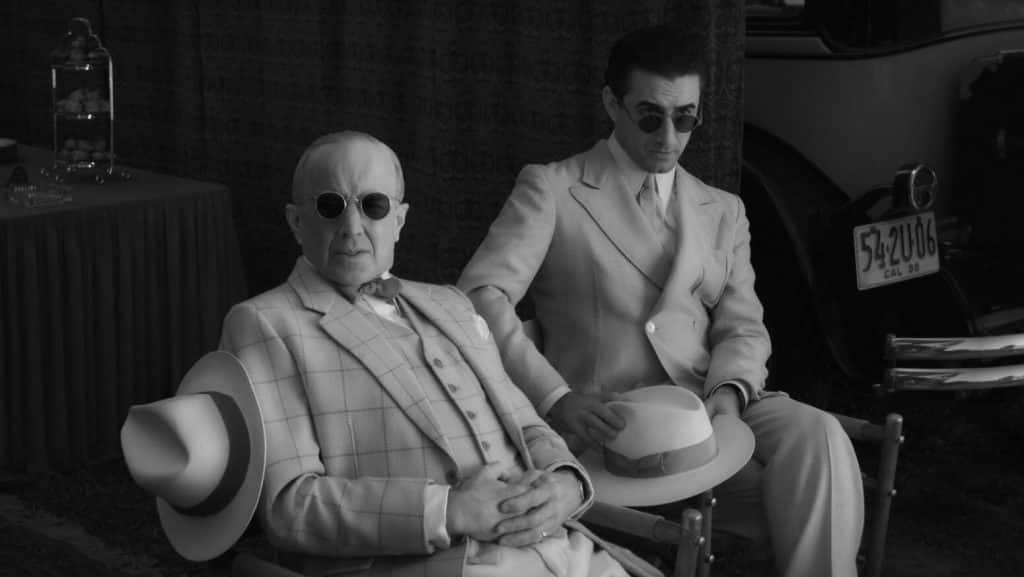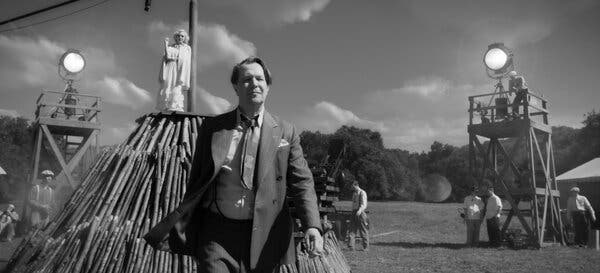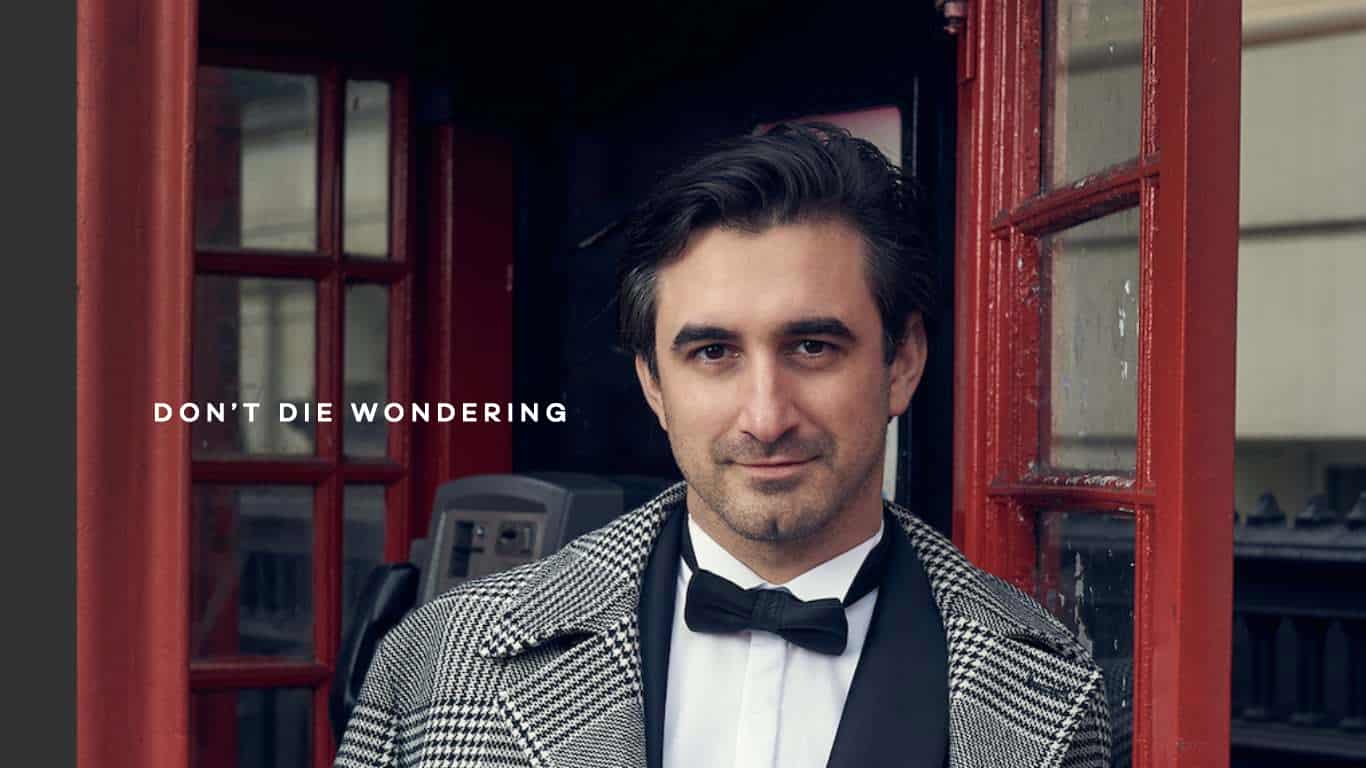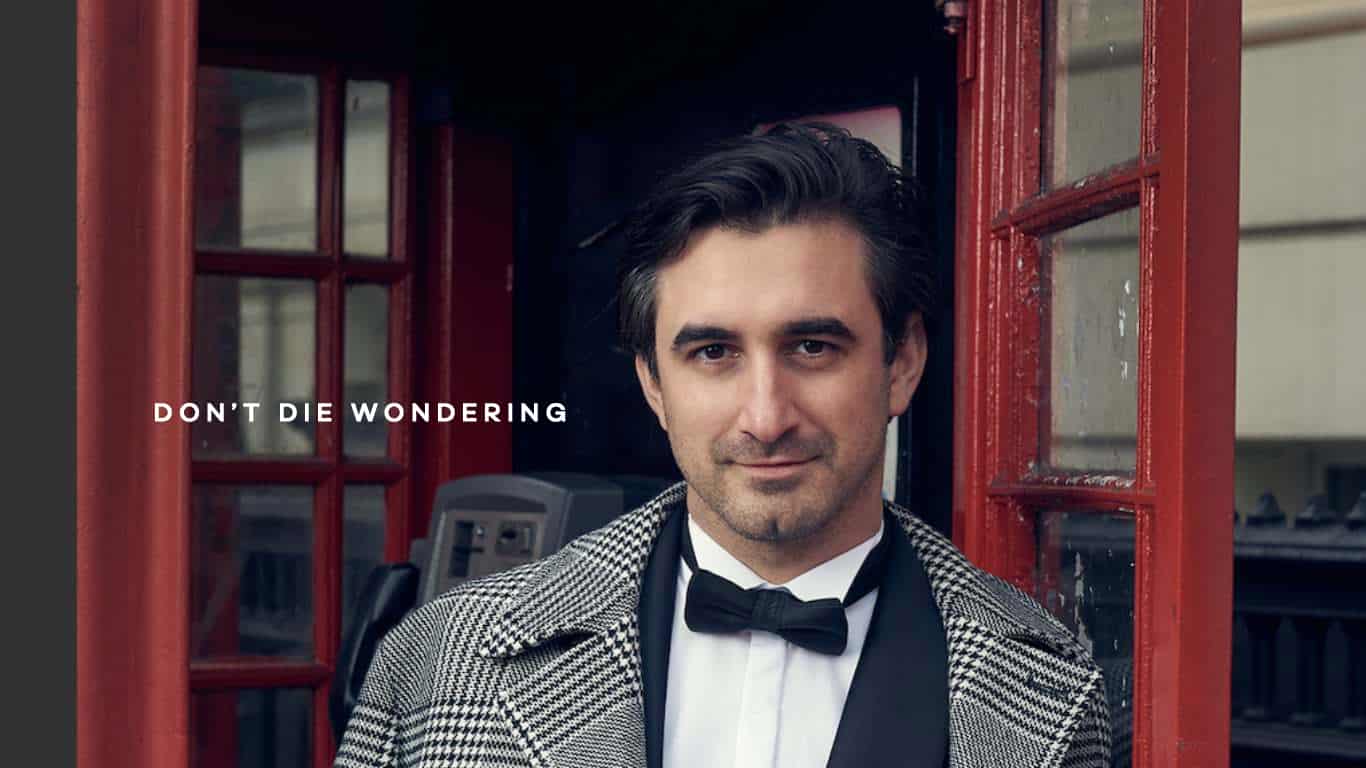An Exclusive DDW Interview
If you are wondering why you keep hearing about David Fincher’s new oeuvre ‘MANK’ – it is because it may well be an instant classic.
The noir-style biographical drama about screenwriter Herman ‘MANK’ Mankiewicz and his development of the script for Citizen Kane brings with it a powerful script (written by Fincher’s late father), gorgeous cinematography, meticulous direction and wall to wall star-power.

Dense, layered, dark yet somehow surprisingly easy and entertaining to watch; this film packs a punch across every level. Themes explored range from power, greed, self-destruction to the political and media machinations that move society. The characters are rich and complex and are beautifully delivered by an incredible cast including Gary Oldman in career-best performance.
Shining bright among the cast is Ferdinand Kingsley (son of Ben Kingsley) who delivers a crisp and haunting portrayal of early Hollywood movie-mogul Irving Grant Thalberg. We caught up with him to discuss his journey, working with Fincher and what it’s like playing a movie legend who may have actually invented fake news:

Stylist: Rory Mcnerney // Clothes by: Hugo Boss
DDW: Today we are talking about your newest project, MANK: a tour-de-force feature length collaboration brought to us by Netflix from the venerable David Fincher. Before we delve in, could you start us off by telling us about your background, what got you into acting and what kept you there?
FK: I grew up in Stratford-upon-Avon, a very theatrical town where both of my parents were involved in the theatre (my mother is a director and my father is an actor).
They met at the theatre and brought me up in and around that world. I remember watching all the grown-ups on stage acting as kids – dressing up, telling stories, making each other laugh, going on adventures in front of hundreds and thousands of people every night – and I had a thought: ‘maybe this is something I can do every day’.
I totally fell in love with it and the importance of telling a story, passing it on – connecting with people, using the work to access stuff that might not be as easy for those watching the story to access.
I then went to drama school when I was 18 (Guildhall School of Music and Drama) and for the past 11 years have been working steadily since. During the first five to six years of my career I did a lot of theatre and then got more and more confident on screen with jobs that meant that I could develop and fine-tune my craft.
When I booked Victoria (ITV/PBS) it meant that I could really focus on developing a character long term, hone in over a three year period and come out with a lot of trust in front of the camera. Before that – the long job runs I had had been primarily in the theatre.
And as it happens, shortly after Victoria ended, the next call was from David Fincher about MANK.
DDW: That’s fantastic. We love getting to know an actor’s trajectory and how they develop their careers. It is inspiring hearing how acting caught your imagination at such a young age –
FK: There’s something almost ancient about acting and the world around it. The whole experience is about sharing – with each other, with the audience, with the future audience (if you’re filming something).
DDW: So true. It reminds us of that moment in MANK when Louis B. Mayer says that as a film producer, the “product remains yours and what you’re selling is the memory of the product…”
FK: Yes! I think this is something he actually said – it’s very accurate – very powerful.
DDW: You are ending this year on a high with David Fincher leading the charge on MANK after his much publicised 6 year hiatus from film. What elements of that drew you to this particular project and did you see or feel much of a parallel with your background in theatre to that early ‘Golden Age’ of cinema?
FK: I do – I think the person that probably sees it more is David [Fincher]. He casts a lot of British actors in the film and a lot of actors that have done a lot of theatre. He didn’t say it explicitly but I did wonder if that was a result of early cinema coming out of theatre and vaudeville.
Theatre and vaudeville is definitely something that stays nearer to the surface as a Brit. And in terms of what attracted me to it – well, I would love to say that this is something that I got an offer for and then I stepped back to think whether or not I wanted to do it… but the reality is that like most actors across most levels – until you’re in the stratosphere – you rely on a great team around you to put you in front of great opportunities.
I was sent the script of this with David Fincher’s name on it and thought, ‘no way this one will work’ but I thought, ‘I will give it a go, at the very least David would watch my tape’. Later on -I was at a music festival when I got the call that David liked my tape and wanted to see more. We exchanged some phone calls and then he asked me to install an app I had never heard of called Zoom (I now wish I had invested in it!).
We spent an hour chatting through the part and of course my webcam broke and I panicked but told him what excited me about the character – that he was a fascinating person that could have been as famous as any of the movie stars of the era – if he had chosen to be (which interestingly he actively did not).
So David and I worked through it and he gave me a million notes and then I got a text at 4am in the morning saying I’d got it and I nudged my girlfriend awake to tell her.
And then, of course, began the actor’s journey; you don’t believe it until you have your offer, then you don’t believe it until you have your visa, then until you’re on set, then until you’ve wrapped, then until you see it (and you’ve not been cut) and then until there’s a pandemic and you watch it on Netflix at home!
I loved every second of it, we worked hard but it was a joy.

Ferdinand is dressed in Hugo Boss
DDW: This film certainly shows the work of a great team; the score, cinematography, direction – everything is spectacular, what was it like to be on a Fincher set?
FK: On a set like that you really have to be at the top of your game – because everyone else is. It would be disrespectful if you weren’t.
It’s like an athlete saying; “I’m going to train everyday so that when the match comes, I won’t be left behind.”
The crew were military – absolutely phenomenal and as a result of this, David promotes from within. As an example, Eric [Messerschmidt] the DOP [Director Of Photography] on MANK – who is amazing – was a gaffer for David on Gone Girl.
One of the grips got a promotion whilst we were shooting as David needed an extra camera operator. He went to him and said, “I’ve seen your showreel and I think you’re really good – I need an extra camera operator for the next two weeks”.
But he’s tough on them – and as an actor he drills you, but I love that – I live for it. I think you have to commit to it – you’re going to be worked hard on a Fincher set. Even as a character who has to be still most of the time. David wanted my character, who’s a fragile man, to be in perfectly symmetrical focus and you need to focus across 50-60-70 takes, that can take its toll on you and you have to stay on it. You have to work hard.
Some may not enjoy it, but for me I love it and I really enjoy it. I would leave work exhausted but feeling better at my job.

Ferdinand is dressed in Hugo Boss
DDW: The film is about the creation of what is considered the best film of all time (Citizen Kane). Could you tell us about the process and about MANK itself?
FK: The film is about the 10 years leading up to the release of Citizen Kane, so like Citizen Kane it has a non-linear approach – it jumps backwards and forwards – and it is about Herman Mankiewicz who wrote (or half-wrote, depending on which side of the argument you fall on) and his uncomfortable proximity to the epicentre of power in the film world.
Mank’s relationship to a new Hollywood that was also starting to flex its muscles in the real world, in politics, media and society (something that is very well and alive today) and his observations as an outsider. Ultimately, he couldn’t stomach its hypocrisy and inner workings of it and eventually he blew it by becoming totally self-destructive.
Alongside this – My character [Irving Thalberg] was known as The Boy Wonder/ Boy Genius and ran MGM with Louis B. Mayer. He was 19 or 20 when he was running his first studio and 23 when he helped set up MGM when took over the production of Ben Hur. He went on to produce 400 films before dying at the tender age of 37 from a congenital heart disease.
I find him fascinating for a lot of reasons but partly because he changed the way films were made – the development of them, the writers rooms… He came up with the idea of doing test screenings, of doing reshoots (both unheard of at the time). He was incredibly powerful and unbelievably rich and extremely right wing (something I do not subscribe to personally).
He was an absolute hater of unions, but his creativity was unbelievable, especially as he ran on a veritable ticking clock. All of his life, doctors had told him he was never going to reach puberty, then to the age of 20, then 30 – so every day that he did not die had to be filled by him. He felt that time wasn’t a luxury that he had and as an actor I think that’s a very interesting thing to explore. It’s a lesson to us all.
DDW: How do you delve into someone of that historical immensity and portray them in a way that does them justice?
FK: There’s something quite freeing in that it is all seen through Herman Mankiewicz’s eyes – the film is experienced through him. All these people, instead of being exactly as they were, they are as Mank remembered them or as they impacted or related to him. So my version of Irving serves a memory to Mank – calculating and cold, which may not be exactly how he was, but that’s how he remembered him.
In performance terms David and I would talk about it: “this is a guy who would not waste a calorie of energy.” In other words – if he’s talking, he’s talking and it’s laser guided – it’s direct and he means what he says. He doesn’t beat around the bush because if you don’t get it done today you might be dead tomorrow.

DDW: It certainly seemed that the dynamic was very interesting between Mayer and Thalberg –
FK: In real life it was fiery, and they had a massive falling out because when Irving was very ill, Louis B. Mayer changed the contracts and side-lined him in the company in order to consolidate more power. In real life Mayer was seen laughing at Irving’s funeral saying, “God’s been really good to me”. Most of Irving’s shares were stolen from him and weren’t passed down to his wife, Norma Shearer
They were Ying and Yang, as were Thalberg and Mank – Fincher wanted us to explore this dynamic that in a parallel universe they could have been quite similar – but Thalberg was a person that did nothing but work where Mank was working despite everything else he did in his life.
DDW: Those themes of self destruction and dizzying anxiety enrapture the film throughout…
FK: Totally – at first when I read it I thought it didn’t feel very ‘Fincher-y’ – whatever that may be. It felt light, and almost silly – and of course it does have all that – but underneath all of that is this ache and dread and sense of foreboding about America and the balance of power in America and the influence of unaccountable people of power in America. And you watch Gary [Oldman] and Mank throughout and you think – people love you Mank and you are the most talented person in the room… Don’t fuck this up! He’s a gross man but yet you still really want him to be happy. One of Fincher’s best skills is that he manages to tackle that without sentimentality.
DDW: It seems quite poignant especially now around the time of the aftermath of the American election and the tension across power and politics.
FK: And my character practically invented fake news! Irving had these beliefs and had the power and ability to influence the world around him to align with that. Although this is relatively loathsome in itself, these people go a long way. It is American depression-era-capitalism in a nutshell.
DDW: You mentioned that Fincher hired a lot of British actors – Gary Oldman, Tuppence Middleton, Lily Collins, Tom Burke, Charles Dance, Sam Troughton…You. Did you sense a ‘Britishness’ to the ensemble to your relationships to each other?
FK: There’s definitely a sense to mucking in and not taking yourself too seriously – which I love and I think comes from the way that British actors approach things in general. I think they find that quite nice to be around with in the States – to have a very gentle cynical gallows humour but very committed to the craft approach to work.
There was a a lot of sitting around and making each other laugh – sometimes it was like being back home. You know, with Gary and Tuppence and Charlie Dance and Lily it felt like sitting in a pub – who’s going to be the next to tell an anecdote about some terrible job they were on – a characteristic which is so British.
Also, shoutout to Arliss Howard [who plays Louis B. Mayer], an incredible man who has really lived! He had the best stories and he would come up to us three to four weeks later and then would do an impression about someone that we did an impression of in one of our stories. He became an honorary British thesp – he lived out here [London] back in the day. I would be telling the story of someone vaguely famous I met once in a pub and he would go “So this time Stanley Kubrick and I got into a fight…”
DDW: We love these anecdotes of the off-screen moments; it always gives a lot of colour to the relationships between the players.
FK: Yes, and there’s a mirror of course because it is kind of what’s going on in the film in a different scale.

DDW: Tell us about Gary Oldman, what an incredible performance – what’s it like working with him?
FK: Well, he’s not only one of the greatest actors of the last few generations, but he’s also almost worryingly normal. First day of rehearsals and he would just come up to you and slap his hand on your shoulder and go, “Hello mate! How you doing? What’s going on at home? Who do you know that I know?”, just like anyone of the rest of us. He has one of those qualities that is one of the finest qualities in any role: he takes his job incredibly seriously but not himself.
He was a joy to work with, and if he ever missed a beat or dropped one of the ten billion lines that he had in the film, he would just have a word with himself and say, “Come on Gary” and just carry on. Never any pretentiousness – always funny and if he was off camera and you were exchanging lines with him, he would give the same as he would for the last 70-80 takes, he had done so that he could work as hard for your turn – which is lovely.

Ferdinand is dressed in Hugo Boss
DDW: The film itself is getting a tonne of Oscar buzz as you are no doubt aware…
FK: Hearing sentences like that is something you dream about as an actor – it is great… My God – I think it should be, it’s fab.
DDW: It is already an iconic film and it almost merits its own category. And for you this must be so interesting since the Academy has its own Irving Thalberg Award, which is the only other award other than the Oscar that the Academy gives.
FK: Thalberg is one of those names that you hear about when they give the award every so often to a great producer, but you don’t really register it or interrogate it. I’ve even had meetings at the Thalberg building in LA on the Sony lot (which used to be MGM) but I didn’t know much about it. But when you dig into it you see that although this guy didn’t put his name to it – he was a huge influence on cinema.
DDW: Isn’t that interesting? It feels like it goes against everything that Hollywood stands for
FK: There’s a quote attributed to him that I think anyone thinking about writing their own Wikipedia page should think about: “Credit that you give yourself is not worth having”.
It’s always a reminder as to why you’re doing this stuff – is it to make great stuff for the ages or is it so that your name is in shiny bright lights?
A great reminder indeed…
MANK is streaming now on Netflix.


